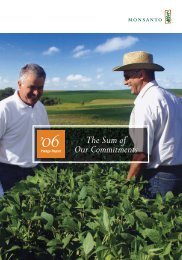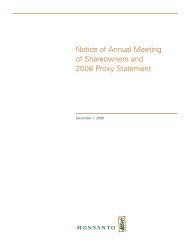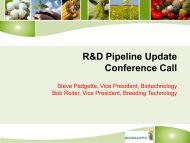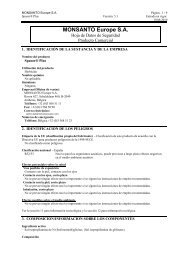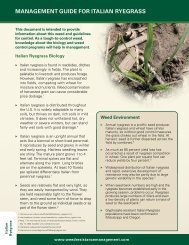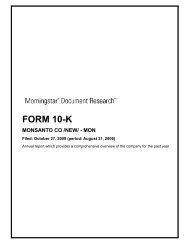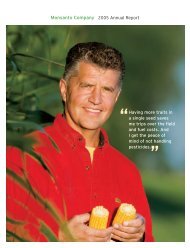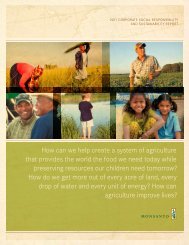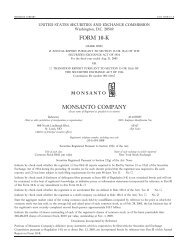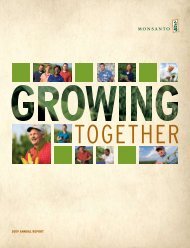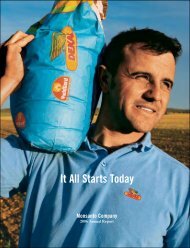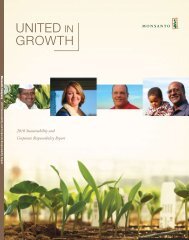Create successful ePaper yourself
Turn your PDF publications into a flip-book with our unique Google optimized e-Paper software.
Case Study<br />
Dialogue Leads to Wheat Decision<br />
In May 2004, <strong>Monsanto</strong> announced that it would defer further efforts<br />
to introduce <strong>Roundup</strong> <strong>Ready</strong> spring wheat until additional wheat biotechnology<br />
traits were offered. Spring wheat accounts for 33 percent of total<br />
wheat acreage grown in the United States and 21 percent of global wheat<br />
acreage. This decision was made for business reasons, informed by practicing<br />
our Pledge commitment to engage in dialogue with many stakeholders.<br />
Several years ago, as <strong>Roundup</strong> <strong>Ready</strong> wheat moved through the technical<br />
development phase, <strong>Monsanto</strong> established a wheat advisory committee to<br />
review market-development and product-stewardship issues related to commercialization.<br />
This panel included growers, grain handlers, millers, bakers, food companies, and other<br />
experts who are involved in wheat or its resulting food products. Company representatives<br />
met with many other stakeholders as well.<br />
They found that although many growers wanted the new technology to help improve their<br />
productivity and soil conservation, the industry preferred to wait until more biotech products,<br />
which offered benefits to a wider segment of wheat growers, were available.<br />
The wheat industry advisory committee helped the company identify six commercial milestones<br />
that should be met before <strong>Roundup</strong> <strong>Ready</strong> wheat could be successfully introduced.<br />
The company committed to those milestones which included regulatory approvals in the U.S.,<br />
Canada and Japan; approvals or marketing arrangements in place in major export markets;<br />
grain handling, sampling and detection methods implemented; comprehensive stewardship<br />
programs in place; quality varieties that meet end-use needs; and buyers identified.<br />
As the team pursued each of these criteria, spring wheat acreage in North America declined<br />
by 25 percent — mostly lost to increased corn and soy acreage. Meanwhile, other <strong>Monsanto</strong><br />
investment opportunities were emerging. Given the percentage of the industry preferring to<br />
wait for additional traits, the shrinking market for spring wheat and the near-term opportunities<br />
elsewhere, <strong>Monsanto</strong> made the decision to defer further development of <strong>Roundup</strong> <strong>Ready</strong><br />
spring wheat. <strong>Monsanto</strong> will evaluate future efforts in wheat biotechnology based on evidence<br />
of industry support and overwhelming grower interest in specific traits.<br />
While shifting resources away from <strong>Roundup</strong> <strong>Ready</strong> wheat, <strong>Monsanto</strong> is accelerating the<br />
development of biotech crop research in the areas of yield improvement and stress tolerance,<br />
agronomic pest resistance traits, and food and feed improvement traits. Growers will continue<br />
to benefit as we bring these traits to the marketplace. “We’re grateful to the many parties who<br />
generously shared their knowledge about the benefits and challenges of moving forward with<br />
this product. Through dialogue, we were able to arrive at a decision that is right for us and<br />
for the market at this point in time,” said Kelly Fleming, <strong>Monsanto</strong> business leader.<br />
DIALOGUE INFORMED<br />
MONSANTO’S ROUNDUP<br />
READY WHEAT DECISION.<br />
{ MONSANTO COMPANY 2004 PLEDGE REPORT: PAGES 24-25 }



